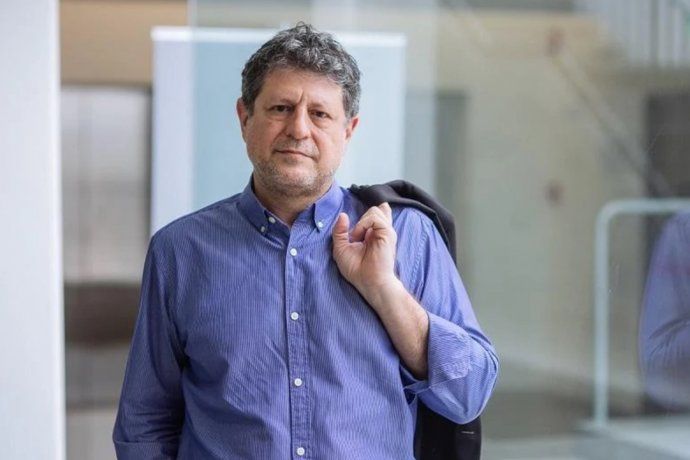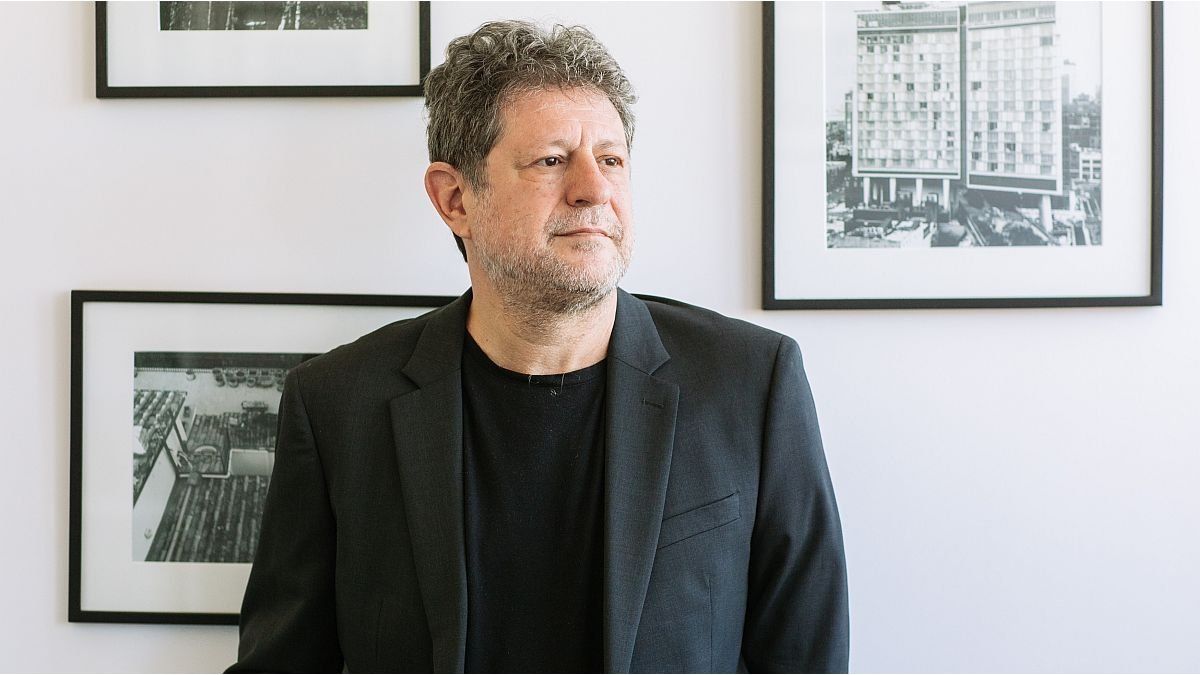Within that there are several aspects of the generative Artificial Intelligence technologies that are coming to light now in recent years that open up more specific questions. For example: new technologies replace knowledge. We have to think about whether we are going to reform education to adapt to technology or what we should transform about education. Competing with the technology, with the program, is a lost battle from the beginning.
In strictly work terms, we have to think of education as complementary to a technology that I believe is unstoppable.
Instead of thinking about programming as the career of the future, which is what we thought 20 years ago and which in fact was the career of the future, we have to think about the more strictly human skills or competencies that will complement or compete, for example. at least with some capacity, against technology: empathy, understanding, creativity.
BOOK Levy Yeyat.jpg
“Automated”, the latest book by Eduardo Levy Yeyati.
Q: If there is less work, you say, there is more time available. And that is why they talk about the “Leisure Utopia”. What is it?
LY: Two things are necessary for the “utopia of leisure.” First, distribute the fruits of technology. If there is less work, we have to think about some other way to distribute resources organically, whether by investing more in public goods and services, or with some variant of universal income or basic income, because we have to do, as Martin Luther said King, to all citizens subject to consumption.
But King, in the same speech, said that at the same time you give a citizen a check, you have to get them something to do, because we, in our Protestant ethic, have organized ourselves around work. If you take men out of paid work you have to teach them, or give them time to learn, other ways of organizing their lives around something. And that something is going to be work, but not the work of the industrial revolution; It is not going to be paid work, but work like the jobs that Aristotle thought of when he wrote about the active life, jobs that can involve social participation, creation, even contemplation. Tasks in which you perform but that have nothing to do with what a job is, with what is productive and remunerated.
We are going to have to decouple the work associated with remuneration from what are the tasks that we do to fulfill ourselves, or integrate, or socialize, or pass the time. So there are two dimensions: the distributive and the cultural or socioecological, which have to be addressed in parallel.
The first is fundamental, because if you don’t you will end up with a very inequitable and stagnant system. The second will possibly take us one or two more generations.
Q: How do you think decision makers view these types of discussions?
LY: There are differences between countries and generations. Only last year did the central countries begin to wake up to the imminence of this technological change, which is qualitatively different. One of the aspects that interests them most is the issue associated with security. Technology, apart from its impact on our lives and our leisure, opens doors to changes that can be potentially good or potentially dangerous, especially in the dissemination of fake news and disinformation campaigns. Large language models still regurgitate information that is in the cloud and cannot necessarily filter everything that is there. You can end up recirculating anything.
But there is little discussion between States. Partly because politicians, governments, those who decide policy, are usually quite old. They have a certain inertia in the way they approach new things.
What we are seeing here are three great qualitative changes of slow process, which the world is having a hard time getting into: artificial intelligence, climate change and demographic change.
Those three are going to completely change the economy and societies, the way we think about societies. It is very difficult for governments to get out of the box with which they have been thinking and distinguish what are cyclical movements from a change in trend. These are big trends and very important turns. They do what they can, but for now the approach is quite epidermal.
Q: What impact can artificial intelligence have on south-north migration processes?
LY: Of the three trends of slow change, clearly the immigration issue has to do with the demographic issue. If we think about it this way, we see that developed countries age and need young blood to grow, but that young blood has a different skin color and generates political changes. It was seen very clearly in Europe and is also seen in the United States. Nobody knows how to solve that.
Color change that will be much more marked in the future, because the source of young blood in the next 50 years will be Africa. Then you would want those African workers to help you alleviate the fall in the ratio of active to passive population, which is what in some way determines your per capita product.
Artificial intelligence could moderate this demand for young blood, because it replaces the worker in many cases.
If you analyze China’s response to its aging, China was the first country to have automation as a state policy. They replaced Chinese workers, not with immigrants but with robots. In some ways they promoted automation as a way to replace the lack of workers.
One could think, speculating, that artificial intelligence could mitigate the need to open the door to migrations that are politically conflictive, even if they are good for the country that sends the migrants, and in that case it could be cooperating with the most politically active. nationalists trying to close the border. It could be thought then that artificial intelligence, to the extent that it replaces these needs and in particular when it replaces low-skilled jobs, could somewhat complement the bias that the most nationalist or most conservative parties generally have towards closing borders and turning a selective immigration.
In that sense it could have some impact. It’s not having it yet, but to put it in a line: El Salvador may have to worry a little about the remittances it receives from the United States if artificial intelligence starts replacing Salvadorans.
Q: What is the relationship between artificial intelligence and political processes?
LY: That’s an interesting point, because artificial intelligence has more impact on politics than politics has on artificial intelligence.
There are many economists who maintain the need to guide, orient, influence technological advance with the same productive development policies that these developed countries have implemented for years through subsidies, taxes, regulations.
We analyze that in the book. I disbelieve that, I believe that today governments do not have a control panel for technologies. They can have very little impact on technologies. I don’t think that’s the way, because they say it’s a way to generate technologies that are more work-friendly, but that’s just taking time. And even in this strategy of delaying the inevitable, I believe that there is little that the states will be able to do.
But, on the other hand, artificial intelligence does affect politics because it will enhance something, which is already being seen, and that is that large technology companies are a power in themselves that is difficult to govern by specific countries, especially in a multipolar world. where there is arbitration between countries.
If you had a single world leader or if you had a world community, organically organized, you could impose conditions as you did for example with the minimun global tax.
But that does not happen in practice with technology. On the contrary, there is a technological war between China and the United States, and there are technological differences and countries in the middle that they will arbitrate. Therefore, it is very difficult for politics to influence technology. It is much easier for technology to condition politics. What was said at one time about the financial system, which had a political impact, will be said in 10 or 20 years about technology companies.
levyyetati.jpg

The book reflects on the impacts of artificial intelligence on politics, the economy and societies.
Q: There is another tension that you raise in the book related to the impact of artificial intelligence on the macroeconomy. As there is less employment, there may be less consumption. How is this tension resolved?
LY: The way to manage that tension through politics is to use the redistribution tools that already exist. If you have a tax system based on corporate and personal income, if it is progressive and you have income concentration among the rich, that rich person will pay proportionally more and tax revenue will increase. And you can give back to that in some way: either in goods and services, trying to ensure that people have more things to consume for free, or directly through a transfer. The most liberal countries will make a transfer and the countries closest to the welfare state will have better public education, better services or social housing.
But to do that it is essential to know if technology is going to increase the size of the pie, because redistributing is always better when you have an extra.
There is a lot of evidence that some of these technologies save costs, but do not increase productivity. The main macroeconomic problem is directing technology towards more productive things.
If this is left to the mercy of the market, it is very easy to generate situations similar to those that occurred in the Industrial Revolution, only with States with very different instructions. A mass of unemployed, poor, outsiders can be generated, who at first will be outside the economic system, but ultimately will be outside the social system.
Q: And that generates political problems.
LY: It generates political problems, it generates outsider populism. Eventually, if you take it to the extreme, as seen in fiction, it generates civil war, looting. We must not forget that we live in a very local equilibrium: property rights and contracts are valid when there is no war. To preserve this organization, which we have bad or good, in which at least we know what we can do and what we cannot do, you need to control the spillover of people outside the system. Politics has to react before this becomes a reality.
The first thing you will see is a drop in demand, but in the future you will see a disorganization of society. And that disorganization is irremediable. It is definitely something that must be avoided and we must also start thinking from a political point of view.
Q: Why, in the face of all this, do you postulate empathy as a refuge?
LY: The human is original. There are a lot of occupations, which we could put the logo “made by humans”, they are going to be very important in the future and many occupations or pieces of occupations take refuge there. Some of the tasks are going to be or are already being replaced, but some are not and they are going to be either complementary to technology or something more artisanal, more human. I think that is the frontier of human work 20 years from now.
Q: How do you imagine the end of the job?
LY: Well, it can be a utopia or a dystopia. But I’ll tell you how I want to imagine it. I would like to imagine it as a return to humanity. We believe that work dignifies us, humanizes us, but most jobs are jobs that we hate. I believe that work does not dehumanize you but it conditions you and if artificial intelligence, or technology in general, allows you to decouple your activities from paid work, you will have more time to go back to searching for what you are as a human being.
Source: Ambito




